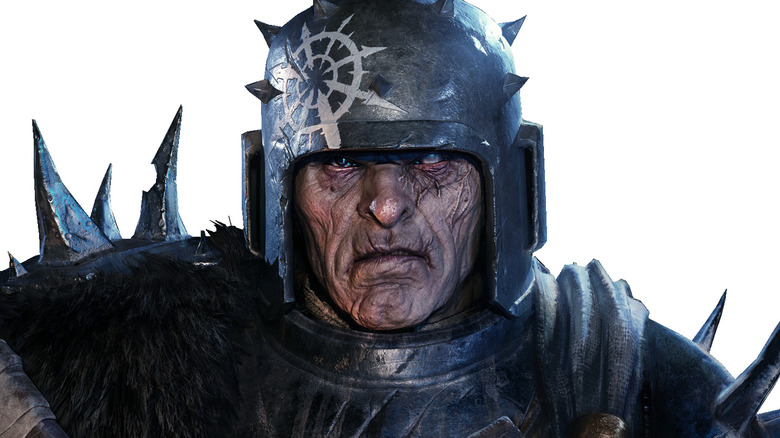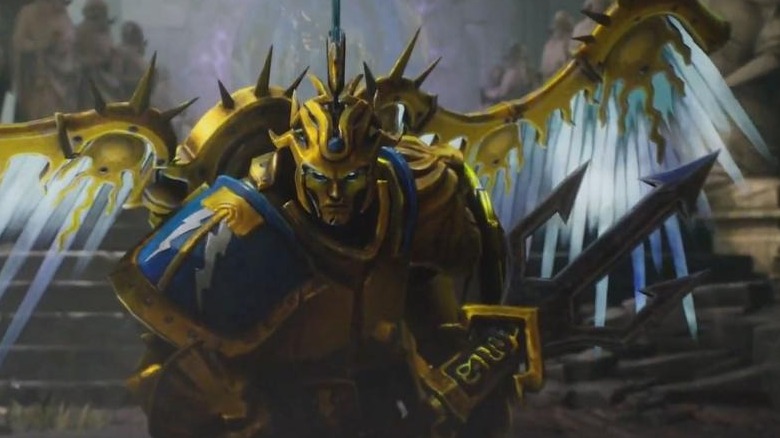The Untold Truth Of Games Workshop
Since its founding almost five decades ago, in 1975, Games Workshop has become one of the essential entities in the world of wargaming. The company's signature franchises, "Warhammer Age of Sigmar" and "Warhammer 40,000," have become powerhouses, while the hand-painted miniatures that defined the tabletop versions of those games have become an industry unto themselves.
However, even as one of the most respected figures in the wargaming community and stewards of a tabletop franchise whose reputation is rivaled only by "Dungeons and Dragons," Games Workshop remains a bit of mystery to many gamers. The sheer price of purchasing playable sets of miniatures (via Reddit) remains an obstacle for many. Games Workshop operates many brick-and-mortar game stores worldwide, but they are more common in Europe and only found in major population centers in the U.S.
However, a lot has happened in the 46 years that the company has been supplying players with the tools they need, and the company's future is brighter than ever. Here is the untold truth of Games Workshop.
The last few years have seen an unbelievable surge in demand for Games Workshop products
As remembered by Games Workshop, while the company began as a simple board game and hobby shop, it quickly became a purveyor of more innovative styles of competitive play such as role-playing games and wargames. In 1981, the company solidified its importance in the world of miniature collectibles when it founded Citadel Miniatures Limited. By 1986, the company had dedicated itself to supporting the "Warhammer" brands, and the company enjoyed a comfortable place in the hobby market for the next few decades.
However, during the mid-2010s, the entire hobby game industry began to see significant growth, as reported by ICv2. Games Workshop's business began to rise as well, supported by expanded licensing deals that brought the Warhammer universe to video gamers around the world. In 2018, the company reported a 54% increase in sales over six months, via The Independent, right as the company released the much better-received second edition of the revamped core "Warhammer" experience, "Warhammer Age of Sigmar."
Games Workshop's growth wasn't even close to slowing down following those incredible periods of expansion. Despite the global COVID-19 pandemic forcing store closures and social distancing, the BBC reported that the company still increased its sales by 26% during 2020.
Games Workshop has grown to be financially competitive with UK powerhouses like British Gas
As a company with a history that spans nearly 50 years, Games Workshop is essentially an elder statesman of the hobby game industry. The only other company in the industry with anything like that sort of longevity might be Wizards of the Coast, which acquired TSR, the board game company that developed "Dungeons & Dragons," but in reality, Wizards of the Coast was only established in the 1990s, as reported by The New Yorker.
That said, in a country like the United Kingdom, where the largest, most influential companies, schools, and public institutions can trace their lineage back hundreds of years, a mere half a century isn't necessarily that impressive. However, Games Workshop's explosive growth during the second half of the 2010s and some interesting developments in the global economy put it on a level footing with an essential U.K. organization — British Gas.
In May 2020, Energy Voice reported that a financial analyst from the consultancy firm Flint Global, Alex White, noted that a rapid drop in the demand for fuel had caused the share price of British Gas' parent company, Centra, to plummet. The sudden decrease resulted in, according to White, Games Workshop being equal in value to Centra. Considering that Centra and British Gas, one of the Big Six fuel providers for the U.K., can trace their origins back to the Gas Light & Coke company in the 1800s, Games Workshop's valuation above that institution was massive, even if it was only temporary.
Games Workshop has released more than 60 video game spinoffs since 2014
Taking a look at an annual financial report distributed to the press by Games Workshop demonstrates that their unprecedented growth is primarily due to the success of their core brands and products. However, a closer investigation shows that another critical segment of their business is growing right along with the company — video game licensing.
One revealing data point included in the financial report states, "Royalty income increased in the year by £1.7 million to £11.4 million." The report elaborates on those numbers, explaining that 87% of that royalty income was from PC and console game sales, while another 7% came to the business through mobile game sales and transactions.
This incredible growth was not accidental, however. In a recent Kotaku article, reporter Luke Plunkett counted a total of 65 distinct video games from the combined "Warhammer" universes available. While some, including Plunkett, might argue that this runs the risk of oversaturating the market, it seems to have yielded positive results for Games Workshop so far.
Games Workshop is launching a new streaming service for Warhammer content
If market saturation is something that Games Workshop is worried about, they certainly aren't showing it, especially considering the recent announcement of their new video streaming platform, Warhammer+. The company recently released a sizzle reel showing off some of the visual approaches for the upcoming shows, all of which are animated but include 2D and 3D designs in various styles.
The new streaming service was developed after Games Workshop recognized the incredible fan project "Astartes" and offered the creator of the series, Syama, a formal position with the company. In their announcement that Syama had officially joined the team, Games Workshop also revealed that multiple other animated shows were in the works.
The official site for Warhammer+ now lists 11 different series being developed for all aspects of the "Warhammer" universe, both in the fantasy-themed "Warhammer Age of Sigmar" era and the futuristic "Warhammer 40K" era. Games Workshop has promised further information on how fans can access the service when the full reveal occurs on June 23, 2021.
Games Workshop has some huge new video game releases coming up
While there is undoubtedly a diverse portfolio of "Warhammer" products available, the company is leaning even further into licensed video games as a significant part of its path forward. Games Workshop has at least six upcoming titles, three of which are being positioned as triple-A offerings that should catch consumers' attention whether they invested in the source material or not.
At the top of the list is "Total War: Warhammer 3," which is supposedly the final entry in Creative Assembly's spin-off series from their core "Total War" franchise. "Total War: Warhammer 2" was called the "best strategy game ever" by PCGamesN, and expectations are sky-high for the follow-up. "Blood Bowl 3," the newest game in the series, which made its debut in 1993 and received a sequel in 2015, is also highly anticipated and expected in late 2021. Finally, "Warhammer 40,000: Darktide," a "Left 4 Dead"-style shooter, has been attracting a lot of attention as the newest game from Fatshark, which also developed the celebrated "Warhammer: Verminitide 2."
All in all, Games Workshop seems dedicated to reaching out to every conceivable niche and providing options for fans of all playstyles imaginable within the "Warhammer" universe.






